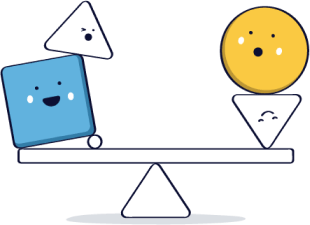
Such beloved performers as Bill Murray, Steve Carell, Stephen Colbert, Amy Poehler, and Tina Fey have all performed on its stage at the start of their careers.
Today, The Second City is just as well-known as a training ground, developing the next generation of comedic talent through its highly regarded classes.
This desire to teach and train extends beyond the realm of comedy and manifests itself in Second City Works, the professional services arm of the celebrated theater. Its programs teach business professionals how to use the principles of improvisation and group collaboration to become the most effective versions of themselves.
We recently had the chance to sit down with Steve Kakos, a Group Vice President at Second City Works, to discuss the organization’s mission and its unique approach to training salespeople.
STEVE KAKOS: The corporate work started 30-some years ago from humble beginnings. People from the business world would come into the theater, see a show, and think, “Hey, I wonder if they would do my sales meeting or do some corporate entertainment.” So we dipped our toe in the water and said, “Sure, we’ll give it a shot.”
We teach improvisation to 20,000 students here in our training center. It’s the largest improvisation school in the world. But a great many of our students aren’t going to go on to SNL because a lot of them come from the business world and the creative community.
We definitely don’t want to be corporate sell-outs, or do anything that would impede our ability to deliver satire in our theaters night after night. But then, we found that the skills of an improviser really translate in the business world, too.
Since then, our trainings have gotten more tailored and more specific to helping our clients solve the hardest problems in business—but in a way that is a little bit more artful, more playful.
We generally work with high performers and high potential, both on an individual and an overall enterprise level. We’re not in the business of fixing the broken. We’re really trying to help people go from “good” to “great.”
Our clients tend to be marketing leaders, learning leaders, HR leaders, and general business leaders. Each of them are strategic thinkers and are always looking for the next thing.
They know that they have to do things a little bit different to succeed, that the risky thing would be to continue doing what they’ve always done.
We’ve become this idea factory of sorts where clients can come and prototype their ideas before a live audience to learn what hits and what doesn’t. We also help our clients launch digital and online content by bringing in strong talent and a comedic sensibility.
And then there’s the garden variety who are just looking for something cool to do, and we’re always willing to oblige.
Fundamentally, “Yes, and” is all about exploring and heightening. As salespeople, we constantly have clients coming to us with their challenges. When that happens, we have two options:
Are we just going to say, ‘Yes, I can do that,’ and put ourselves in order-taker mode? Or will we say ‘Yes, and’ and explore additional options, challenge their thinking, test their assumptions, and treat them the way that we all want to be treated?
In the early stages of building rapport with a client, it’s important to say, “I really want to focus on the best possible way to do this and not limit ourselves. If we decide we don’t want to do this together, that’s okay. But for now, let’s enjoy this conversation we’re in. Then later, we can narrow in on something that we all feel good about.”
Sales is often very superficial, face-value, and literal. “Yes, and” gives salespeople the ability to make things a little bit more fun, playful, and provocative. It also makes the process feel like a collaboration rather than one person doing something to the other.
Again, some of the framing in sales training can be kind of rote and literal. We help our clients become more audience-centric, empathetic, and lighter on their feet, rather than asking them to take the typical approach which is, “Here’s my talk track, here is what my product does.”
We also teach our students to play the scene they are in, not the scene they want to be in.
So many salespeople listen until they hear something they like and then load up from there with something they know works every time. But that can feel gross to a buyer. It’s a lot more effective to have a genuine back-and-forth.
Being comfortable with being uncomfortable is incredibly important. For example, I could go into a pitch with a 20-page deck, and not allow my audience to speak until I finish my sales presentation. Or I could go on a journey with them and have a guided, smart, focused conversation.
I think most clients and most buyers of services would rather do the latter. But most salespeople over-index on the former.
I think the best thing we can do to help salespeople become better storytellers is to change the conversation about who the hero is. The hero is not them, the salesperson. It’s not their product, either. The hero is the client or the buyer.
If sales organizations can become more empathetic and talk about why they do what they do and the ways in which they help people, they would be a lot better off, and people on both sides of the desk would have more interesting sales conversations.
I think the root of both of those qualities is listening. It’s being very focused on the other person and what they need from you at that moment, rather than you trying to take over and look good. It requires a lot of effort. You can spend a lifetime learning and improving at it.
I think we should give people more props in the sales world for being excellent listeners instead of being charismatic or persuasive.
“Are you in the moment with me? Are you really hearing what I’m telling you?” In my experience, clients really do want to get into the right conversation, but it needs to be a guided, deep discussion focused on being together in the moment.
Unfortunately, a lot of buyers don’t feel like they’re being listened to, or it feels too superficial, like the person selling to them is just parroting back what they thought they heard, oversimplifying it, then linking back to their solution. It just feels bland. It’s not a real conversation.
We tend to think and act in terms of an ensemble. It’s very much “what can we do as a team” versus “how do we sift through this weird collection of individuals?”
At an organizational level, we focus on how sales teams can think and act as an ensemble and how to make it so they’re not competing with each other or being territorial, but helping each other win.
The benefit of that mindset is that you’re not as weak as your weakest link. You’re really as weak as your inability to compensate for that weak link and help make it stronger.
Could your sales organization use some inspiration? Get in touch with Second City Works and sign up for one of their fantastic programs to improve your sales team’s communication and collaboration. Have fun!

Join 30,000+ other sales and marketing professionals. Subscribe to our Sell to Win newsletter!
 Email & Calendar Sync
Email & Calendar Sync
Use our calculator to add up your total investment of CRM and Add-ons
VIEW ALL PRICING
 Product Info
Product Info Education & Guides
Education & Guides Company
Company